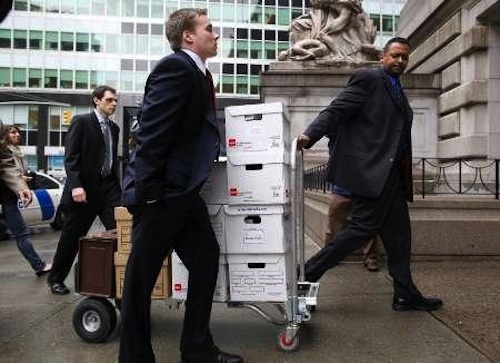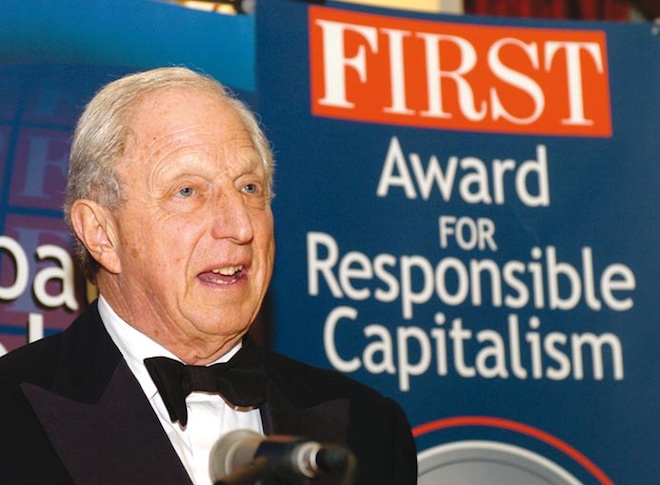The reform process
 Tulkinghorn •
Tulkinghorn •  Wednesday, July 11, 2012
Wednesday, July 11, 2012 Regular "reform" prevents there being any ... Pleadings and the generation of highly profitable crap ... How to make procedural rules better (i.e. worse) ... Tulkinghorn on the reform caper
 Pleadings make the cartloads bigger
Pleadings make the cartloads bigger
THE primary business of the law is to make business for itself. Lawyers and judges create superfluous and overly-complex litigation procedures in order to enhance their status and incomes.
These procedures are claimed to be necessary so that the interests of justice may be better served, but there is always a danger that "make business" procedures will be seen by the laity for what they really are.
The best antidote to such clarity of vision is for the legal profession to be seen promoting "reform".
Reform, however, that won't actually change anything that matters. Reform that will makes things worse (i.e. better for the profession.)
One would have to be a scoundrel to engage in such shenanigans, but as the former Chief Justice of NSW reminded us:
"When Dr Johnson defined patriotism as the last refuge of a scoundrel, he was unconscious of the then undeveloped possibilities of the word 'reform'."
Spurious reform exercises have a limited shelf life, as more and more members of the laity realise that plus ça change, plus c'est la même chose.
So the process of reform has to be ongoing.
Once the last lot of 'reform' is seen to have done very little, a new reform exercise is started up. Querulous members of the laity will then be told they have to wait until the new "reforms" are sorted out.
They will be asked to make submissions which will be ignored, and there will be consultations, issues papers, discussion papers, reports, draft rules etc; stretched out over quite a few years.
The reform cycle seems to call for the law to be reformed (i.e. not reformed) about once every 10 years.
To consider one example, there is always pressure for legal fees reform, since fees never seem to go down. In England on May 11 the appropriately named Master of the Rolls admitted (see pp 2 and 3).
"We have had [costs] ... reviews at least every decade since the turn of the 20th Century [and that since 1986] things have got worse."
In Australia the civil justice system has been subjected to just as much "reform" scrutiny, and Australia's system keeps on getting worse (better) in key areas.
Indeed, in Australia the "reform" cycle might be less than 10 years. In May the retiring Chief Justice of South Australia John Doyle said he had seen so many reports in his career dealing with the civil justice system that "they could fill a room".
 In the process of generating pleadings, which (the late) Peter Hayes QC described as a "an impediment to justice"
In the process of generating pleadings, which (the late) Peter Hayes QC described as a "an impediment to justice"
THE ways in which non-reform is achieved in civil litigation can be demonstrated by considering pleadings.
If the picture seems a little bit over the top, then consider footnote 99 here which quotes an Australian QC opining that "pleadings are a big heap of crap, essentially".
Pleadings are very profitable crap. A suitably sized heap of pleadings (for example) can be worth a fortune. Even just rearranging the heap can create massive litigation fees, as Australian client Tony Loiere discovered.
Tony's lawyer sent him "a bill for $27,000 for amending a statement of claim [i.e. a pleading] drafted by another lawyer".
That's a lot of money to pay for re-arranging a heap of crap. One wonders how much its creation cost.
Apparently the amendments made by a solicitor to the statement of claim were "overwhelmingly of style rather than substance".
One might wonder how lawyer training courses teach the drafting of pleadings. How does one tell a trainee lawyer that his or her draft statement of claim contains too much style, and not enough crap?
It is apparent from Perth barrister Nicholas Mulvaney's Sacrificing the Sacrosanct (see especially footnotes 62 to 64) that acknowledgment of the crap content of pleadings can be traced back in England to at least 1880.
In that year, a Committee on Procedure presided over by the Chief Justice had a fit of integrity and concluded that pleadings were "of little use" and actually recommended that they should not be allowed in any case at all, except with a court's prior permission for a specific case.
A rule of law to that effect was created in 1897.
The judges defeated the rule by granting leave "in virtually every case".
In South Australia a new set of pleadings rules was introduced in 1987. Further amendments were made in 1993.
Far from producing reform, the new pleading rules were employed as tactical weapons and as a means of oppressing opponents.
Costs increased without any consequential benefit to litigants. Paradoxically, pleadings in South Australia have become longer and longer and so particularised as to become almost unintelligible.
Judges are in a strong position to demand procedural reform. Indeed they could just start behaving in a properly managerial manner, instead of letting lawyers run the show (which leads to such nonsenses as pleadings).
But, as US legal academic David Barnhizer has said:
"It is important to remember that judges are part of the system and not reformers, no matter what they profess."
When Justice Brian Sully retired in 2007 from NSW Supreme Court he said:
"It seems to me imperative to get right back, in every aspect of law reform, to that simple proposition: it is for the proponents of the reform, not to explain with a lot of empty rhetoric what they want, but to put on the table in clear and precise terms what they say is wrong with what we have; what they say we should have instead of what we have; and how they demonstrate that what they are proposing would improve on what we have."
 Lord Woolf: reformer whose reforms were wrecked by judges and the profession
Lord Woolf: reformer whose reforms were wrecked by judges and the profession
THEN what do the judges do? Consider a "hot button" issue:
In January 2007 in England The Guardian reported:
"Government plans for changes in the law to boost rape conviction rates are in disarray after the judges who would have to put them into practice told ministers they oppose them.
The Council of Circuit Judges, the influential body representing all 637 circuit judges in England and Wales, has dismissed ALL [my emphasis] the proposals."
In the civil law, in England, the biggest procedural reforms for over century were the Woolf reforms of the late 1990s.
In 2005 in Sydney, Arthur Marriott, an eminent visiting English QC said:
"I was and I remain a supporter of the Woolf reforms in promoting settlement and its simplified approach to litigation.
The real problem is not that they are flawed, for no system is perfect, but that they have been wrecked, or they are being wrecked, by the legal profession and by judges who are simply not implementing them and not applying the new rules in a sufficiently robust way."
Procedural law has been made complex, and as European professor Jan Smits wrote in 2003:
"The more complex an area of law is (in the sense of impenetrable, taking a lot of time and effort to get to know it), the less likely it is that it will change as a result of outside pressure."
For practical purposes, when judges and lawyers conspire to defeat procedural reform, no one can stop them.
 Civil law reform,
Civil law reform,  Law reform,
Law reform,  Pleadings,
Pleadings,  Woolf reforms
Woolf reforms 









Reader Comments